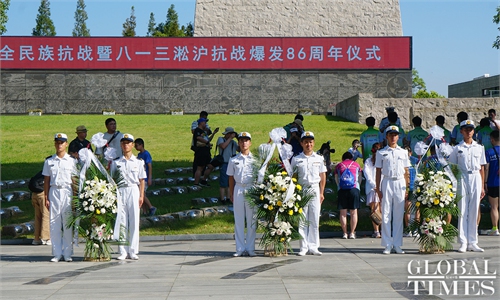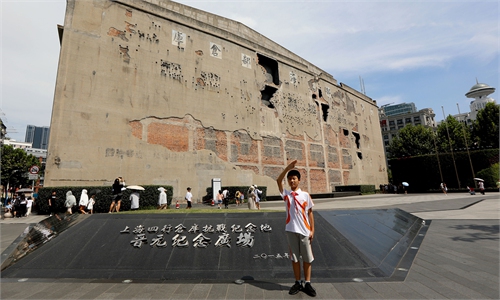
A commemorative activity commences at the Victory Square of the Shanghai Songhu Memorial Hall of the War of Resistance Against Japanese Aggression on August 13, 2023, in Shanghai. Photo: Lu Ting/GT
Shanghai held a series of commemorative activities on Sunday, August 13th, marking the 86th anniversary of the Battle of Songhu, also known as the Battle of Shanghai. These events aimed to honor the soldiers who fought and sacrificed their lives during the battle against Japanese invaders, while also providing an opportunity for more people to learn about this history.
At 8:13 am, a commemorative activity commenced at the Victory Square of the Shanghai Songhu Memorial Hall of the War of Resistance Against Japanese Aggression, accompanied by a solemn flag-raising ceremony. The participants, including researchers, students, and descendants of veterans, paid tribute and laid flowers to commemorate those who died in the battle against the Japanese invaders.
The event invited experts and scholars from both sides of the Taiwan Straits, as well as colleagues from the memorial halls. This event aimed to promote understanding between compatriots on both sides of the Taiwan Straits, encouraging them to "remember the history, carry forward the indomitable spirit, and promote cross-Straits cultural exchanges to achieve national rejuvenation," said Tang Lei, curator of the Shanghai Songhu Memorial Hall of the War of Resistance Against Japanese Aggression, in an interview with the Global Times on Sunday.
The Songhu memorial hall fully reflects Shanghai's 14-year history of the war of resistance against Japanese aggression (1931-45) through various forms of presentation, including text introductions, pictures, cultural relics, and other art installations. Since its opening on January 28, 2000, the memorial hall has welcomed more than 8 million visitors from both home and abroad, according to Tang.
Multiple patriotic education activities are held each year in the form of historical exhibitions, commemorative speeches, and expert seminars. These activities aim to preserve historical memory and encourage reflection on the significance of peace and unity, explained Tang. Recognizing that youth are the hope of the motherland, Tang emphasized that patriotic education in the new era should focus on fostering a strong sense of loyalty and love for the country among them.
"My father always told us to cherish peace," Zhu Weiji, a descendant of General Zhu Fuxing who participated in the Battle of Songhu in August 1937, shared with reporters on Sunday.
Relevant departments have made commendable efforts to collect materials and organize exhibitions, enabling more people to learn about history and realize the importance of peaceful coexistence, said Zhu. "We hope that the next generation can draw lessons from history and work diligently to make our country even stronger, as only a strong country can prevent bullying from others."

Commemorative activities held at Sihang Warehouse Battle Memorial on August 13, 2023, in Shanghai Photo: Chen Xia/GT
The defense battle of Sihang Warehouse, which took place in downtown Shanghai in October 1937, was a solemn and poignant part of the Battle of Songhu.
The battle involved a battalion of the Chinese army trapped in the warehouse, courageously fighting alone against the imperial Japanese army for over four days with immense courage and sacrifices. This battle provided crucial time for the Chinese army to retreat and garnered international support by showcasing China's unwavering determination to stand against formidable invaders.
This defense battle gained widespread recognition in China and even globally, largely due to China's war epic, "The Eight Hundred," which held the top spot at the global box office in 2020.
On Sunday, the Global Times witnessed tourists flocking to the site of the battle, known today as the Sihang Warehouse Battle Memorial, near Shanghai's iconic Huangpu River. Many of these visitors were teenagers guided by their parents, eager to learn about a history filled with bloodshed, tears, and resilience.
The memorial also hosted a series of commemorative activities, including themed choruses, instrumental ensembles, poesy recitations, and a history lecture.
The Sihang Warehouse defense battle serves as a typical example of diverse Chinese groups uniting to jointly combat Japanese invaders during World War II, said Ma Youjiong, the director of the memorial. "It embodied the determination of the Chinese army and people to resist invasions," he told the Global Times.
"We hope that those who visit the memorial and participate in our Sunday activities can gain insights into and remember this history," Ma emphasized.
As an essential battlefield in China's War of Resistance against Japanese Aggression, Shanghai bore witness to the development of China's national united front against Japanese aggression, noted Ma Jun, a research fellow at the Institute of History under the Shanghai Academy of Social Sciences.



